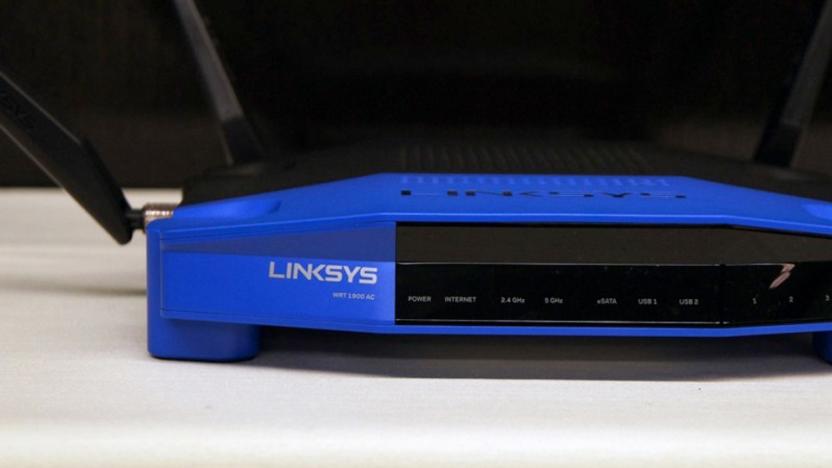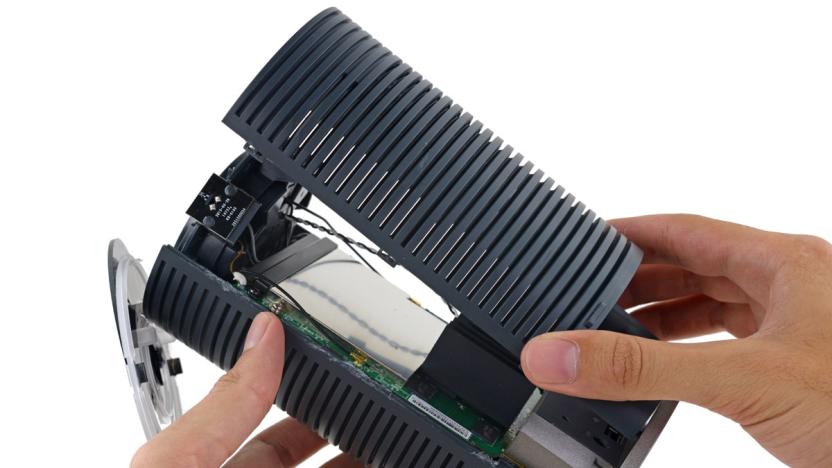wi-fi
Latest

Verizon's WiFi calling is available December 8th on two phones
Verizon didn't take too long to get the ball rolling on WiFi calling. The carrier has announced that it'll make the feature available to customers with Advanced Calling (read: voice over LTE) starting December 8th. Unfortunately, you'll have to be picky about your choice of phone at first -- it's only available on Samsung's Galaxy S6 and S6 Edge to start with, and Big Red won't have updates for more phones (including iPhones) until early next year. Still, it's hard to knock this too much -- between this and AT&T's recent addition of WiFi calling, you can now go to any major US carrier and expect to make online calls when your cellular signal has gone down the tubes.

FCC: Yes, you're allowed to hack your WiFi router
A few months ago, the FCC proposed regulations that theoretically banned the use of open source firmware on your WiFi router. Needless to say, that rubbed a lot of enthusiasts the wrong way -- how were you supposed to improve features or security on your own terms, especially on routers that were designed to be hacked? Well, you needn't fear any longer. On top of reassurances from October, the FCC has modified its proposal to allow open source firmware like DD-WRT or Tomato. The agency will only forbid tweaks that take a router "out of compliance," such as an overly strong signal. In short, you can flash your WiFi hotspot in the future without worrying that the feds will come knocking.

Libratone jumps into multi-room audio with its latest speakers
Libratone isn't content with churning out more cloth-covered wireless speakers -- it wants to muscle in on Sonos' home turf. The upscale gear maker has launched both an updated Zipp speaker and a smaller Zipp Mini (shown above) that include multi-room audio. You can link as many as six of the zipper-clad speakers over WiFi, much like some of their peers. The key, as you might have guessed, is that everything is portable. If you're jonesing to move your entire setup to a new room, you can do it without feeling like you're moving house.

JetBlue will have free satellite WiFi on every flight by fall 2016
JetBlue's plans to outfit its aircraft with fast satellite WiFi are most definitely on track. The airline has announced that it not only has Fly-Fi on all of its Airbus aircraft, but that it expects to have the free internet access aboard all its remaining flights by fall 2016. That's a big deal, particularly if you're a frequent flier -- it guarantees at least one carrier that will have relatively brisk (20Mbps per device) connections on every trip, whether it's a short hop or cross-country. JetBlue no doubt hopes that you'll use its expanding service to buy a few things, but it's hard to be too cynical about the company's motives when some other airlines charge you for WiFi that's virtually unusable.

August unveils a Homekit-enabled lock, keypad and doorbell camera
August Home Inc, makers of the August Smart Lock, announced the forthcoming release of three new products as well as a new service at a press event in San Francisco today. The new product lineup includes a second-generation Smart Lock, a Smart Keypad and a Smart Doorbell Camera. The lock itself offers a number of design improvements over its predecessor including a magnetic faceplate that won't pop off every time you manually engage the lock as well as a stainless steel indicator on the lock sleeve. Plus, being Homekit-enabled, the new Smart Lock will allow users to issue voice commands through Siri rather than opening the app itself. It's available for order today and will retail for $230. The older generation locks will be discounted to $200.

Microsoft will deliver low-cost broadband to 500,000 rural Indian villages
A major partnership with Google putting free Wi-Fi in 400 train stations wasn't the only major network news coming from India today. The Indian government also announced on Monday that it will pair with Microsoft to bring low-cost broadband connectivity to half a million villages throughout the subcontinent. That should help at least some of the estimated 4 million people that go without internet connectivity every year

Google is putting WiFi in 400 Indian train stations
India may be rapidly building up its reputation as a tech-savvy country, but there are still hundreds of millions of people in the country who've had little to no experience with the internet. Google may have a clever solution to that problem, however. It's installing WiFi (initially for free) in 400 train stations across India, with 100 of the busiest stations due to get online by the end of 2016. The hope is that this will connect the 10 million people who pass through India's train system every day, letting them experience the web even if they'd otherwise have no access at all. And it's not basic data, either. Google is promising speeds good enough to stream HD video and otherwise outclass what many Indians are familiar with.

US and Chinese firms agree on high-speed rail plan from LA to Vegas
Pledge agreements aren't the only deals being inked ahead of Chinese President Xi Jinping's first official state visit to the US. A consortium led by China Railway Group has come to terms with America's XpressWest Enterprises LLC to jointly build and operate a high-speed rail link running between Los Angeles and Las Vegas. The project has already cleared its environmental impact study, obtained all of the necessary DoT licensing and right-of-way approvals, and is ready to begin building as soon as next September. China Railway has already put up $100 million in initial capital. According to China Railway, the route will span 230 miles between Las Vegas and Los Angeles proper. XpressWest's website, however, claims the tracks will stop in Victorville, California, 85 miles outside of LA, and 55 miles closer to its destination.

Google OnHub teardown reveals a curious, complicated WiFi router
If you think Google's OnHub router looks like a strange machine on the outside, wait until you get a look at the inside. DIY repair outfit iFixit has torn down Google's first WiFi access point (technically TP-Link's), and it contains some components you definitely aren't going to find anywhere else. The OnHub's signature, congestion-fighting antenna looks more like a set of crosshairs than any kind of networking gear, and there's another diamond-like antenna for focusing signals in specific directions. You'll also find wires that dangle like "tentacles," and a heat sink that pulls warmth through the circuit board.

FCC fines company $750,000 for blocking hotspots
The Federal Communications Commission announced on Tuesday that it is fining Smart City LLC $750,000 for blocking Wi-Fi hotspots. The company provides hotels and convention centers in Cincinnati, Columbus, Indianapolis, Orlando, and Phoenix with its own brand of wireless connectivity. Smart City typically charges users $80 for access. The FCC began investigating the company June of last year following complaints that it had been actively blocking convention-goers from using their personal Wi-Fi hotspots. Today's settlement also includes assurances from the company that it will not block hotspots in the future. [Image Credit: Bloomberg via Getty Images]

The best Wi-Fi extender (for most people)
This post was done in partnership with The Wirecutter, a list of the best technology to buy. Read the full article here. We spent a total of 110 hours researching 25 different Wi-Fi extenders (and testing 10 of them), and the $100 Netgear EX6200 is the one we recommend for most people right now. It costs as much as a great router—but it has the best combination of range, speed, flexibility, and physical connections of any extender we tested.

Nest Cam review: a slightly better Dropcam
Keeping an eye on your family, pets, neighbors and maybe a thief or two is the pitch for the Nest Cam. The evolution of the Dropcam Pro WiFi camera isn't much more than a modest hardware upgrade with the Nest name now attached. And while the $199 device shoots higher-quality images and features a better stand, unlike the other two products in Nest's lineup, it doesn't work with anything else you might have in your connected home. Still, it's a great way to keep tabs on your abode while you're away.

WiFi devices will soon talk to each other before they connect
WiFi-equipped gadgets don't really say anything to each other before they connect, which limits what they can do -- you can't use them as Bluetooth-like smart beacons, or quickly find who's sharing photos. All that's going to change soon, though, thanks to the newly unveiled WiFi Aware spec. The technology has devices swapping tiny messages about their services when they detect each other, making it easy to send alerts and connect only to those devices you care about. You could quickly find nearby rivals for a multiplayer game, for example, or get a notification about a sale when you wander by a preferred store. And no, battery life shouldn't take a hit. Although WiFi Aware can run in the background, its use of a common "heartbeat" for the sync process could actually make it more efficient than conventional WiFi.

Virgin's new in-flight WiFi is strong enough to stream video
Virgin America has announced that it's teaming up with satellite internet company ViaSat to provide the fastest in-flight WiFi of any commercial carrier. The new system uses a hybrid Ku-/Ka-band receiver to deliver an internet pipeline eight to 10 times faster than anything else on the market. The Ka-band alone offers a whopping 140 gigabits-per-second throughput. It's being installed on the company's new fleet of A320 airliners and will be put into service on Hawaii-bound routes starting next year. That alone is a big accomplishment as the rest of the airline's fleet have to rely on ground-based WiFi connections, which don't work over the ocean's expanse. Virgin touts that this in-flight connection will be equivalent to an average home broadband link and users are expected to use it as such, streaming videos, watching the carrier's 18 channels of DishNetwork and surfing the internet with abandon -- just at 35,000 feet.

Google's urban tech lab is working on free, city-wide WiFi
When Google unveiled its urban improvement initiative, Sidewalk Labs, it left one big question: what was this new outfit actually working on? As of today, you should have a good idea. Sidewalk and a group of investors have bought and merged two key companies behind LinkNYC, an effort to offer free, public WiFi across New York City. The combined entity, Intersection, will extended LinkNYC's internet-for-all technology to cities worldwide. Ideally, you'll one day "walk down any street" and expect to get fast wireless data. That sounds more than a little ambitious, but it makes sense given Google's sheer clout and desire for a ubiquitous internet. The easier it is for you to hop online, the easier it is for Google to serve up its money-making ads.

NYC commits $70 million toward universal broadband
In an ambitious effort to close New York City's digital divide, the De Blasio administration has announced that it's going to spend $70 million bringing high-speed internet access to the city's residents. An estimated 22 percent of New Yorkers overall lack a home internet connection (with that number jumping to 36 percent for the poorest residents), which significantly impacts their social mobility, according to the mayor's office.

'Lucid Sleep' keeps your Chromebook connected during naps
Getting back to work after waking your Chromebook Pixel from its digital slumber is about to get a bit easier. Google announced that its new (still experimental) Lucid Sleep feature is now available. This setting maintains limited Wi-Fi connectivity when the machine is powered down so that it can stay better synced with the rest of your devices and data. It will, for example, allow your Pixel to temporarily rouse itself and connect to a new wireless hotspot if you move locations. It can also update push notifications and app data so that everything is up to date and ready to go as soon as you flip open the screen. You can turn on this feature and try it for yourself by selecting "Keep WiFi on during sleep" in the Privacy settings menu.

Feds ask airlines to look for theoretical WiFi hacks
The FBI and TSA have begun telling airlines to watch out for passengers attempting to access their planes' internal navigation networks, despite lacking evidence that anybody's ever actually tried to do so. The Feds are warning aircrews to look for people attempting to access these networks via the public-facing WiFi, through the In-Flight Entertainment systems or by physically connecting to the network ports that everybody now knows are located under their seats.

A motorless flat antenna could solve horrible in-flight WiFi
The only thing worse than no WiFi on a plane is horrible WiFi on a plane. You cautiously throw down a few bucks hoping you'll be able to surf the internet without seeing a "page not available" message in your browser. According to Kymeta CEO Dr. Nathan Kundtz, the reason your in-flight internet connection is so crappy is bandwidth allocation and antenna design. Kundtz told Wired that the FCC needs to open up more spectrum in the less crowded higher frequencies. While we wait for that to happen, Kymeta introduced a new low-profile antenna to take advantage of the spectrum that's already available and actively track satellites for a speedier connection.

Your iPhone can make WiFi calls on Sprint
Using an iPhone on Sprint? Good news: you just got WiFi calling. If you install both the iOS 8.3 update and a matching carrier profile rolling out this week, any iPhone from the 5c on up can make voice calls on Big Yellow using a WiFi hotspot. As on other devices (and T-Mobile, or EE in the UK), this is all about giving you calls in basements, big offices and other places where you might get flaky reception. The upgrade won't help you much if Sprint's coverage is less than stellar in between the access points you use, but at least you won't risk missing an important chat because you're stuck in a cellular dead zone. Photo by Will Lipman.


